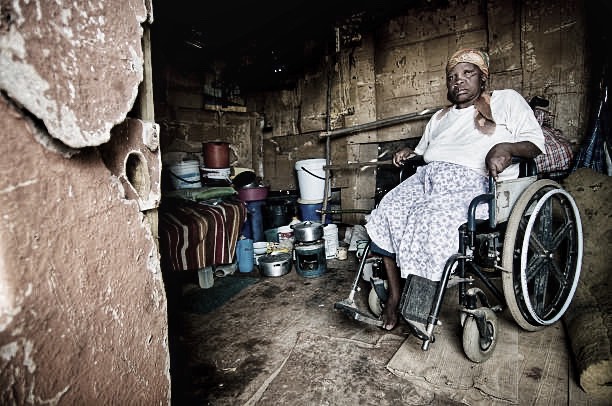Usman Hamdala wakes up every morning with a heavy heart burdened with depressive thoughts.
A person with albinism, the 25-year-old takes each judgemental stare and laughter thrown at him like a dagger through his frail, fair skin. He says he feels incomplete and carries the weight of shame his birth has brought upon his family.
Hamdala longs for acceptance, understanding, and an end to the stigma associated with his condition< But every day he feels like this is a dream too big. He wishes he could change things.
“I wish I would wake up and see myself with a different skin colour – either black or white,” he said, trying to crawl back the emotions in his voice. “I am 25 years old, but I still do not feel like I am because my parents always have to care for me like a baby.”
Being around educated people didn’t help. “When I was deployed to Kwara state for my [national] youth service, I met some people who always laughed at me when I spoke at our weekly meetings,” he said. “Some would say, ‘Mr white man wan talk, make una give am space make him colour talk.’ Those words were hurtful, but it did not stop me from saying what I wanted to.”
Usman is not alone. The World Health Organisation or WHOestimates that about 25 million Nigerians live with at least one form of disability or the other. Of those, 3.6 million face significant difficulty in functioning without physical support.
People with Disabilities or PWDs in Nigeria constantly endure stigma, discrimination, and obstacles when accessing social services and economic opportunities. Inadequate facilities, including inaccessible infrastructure, learning materials, and a lack of trained teachers in inclusive education contribute to poor educational outcomes for PWDs.
Society often views individuals with disabilities as charity cases, excluding them from important decision-making processes that affect the country.
Family as backbone
While the world seems to crumble around them, PWDs depend on their families for strength, according to Usman. From primary through secondary school, he depended on the love of family during the days of illness.
The situation is not different for Faith Mamaiko, a virtually impaired 20-year-old based in Abuja, the Nigerian capital, whose father is also virtually impaired.
“I would like to believe that not being able to see is one of the most horrible things that would happen to a person,” Mamaiko said with a sad voice, “But the love that surrounds me has proven that wrong. My mother takes care of my father and me, and makes sure that we are fine.”
Mamaiko said she faced situations that tested her mental stability, “but my mother was there to fill that gap. I have encountered people who mocked me, and it is hard to remember that I cannot open my eyes when I wake up.”
While her mother tries to feign strength outwardly as she shoulders the burden, Mamaiko thinks she might be at a breaking point.
“I strongly believe that most of the pressure goes to my mother because she has to go through a lot to feed us, send me to the school where I learn with my kind, and encourage me to dream big even when I cannot see things,” she said.
“She has been insulted and dumped by her family members because she married my father, whom they believe comes from a family of witches. Nothing will make me happier than seeing her achieve everything she desires.”
Need for more
To address the needs of people with disabilities, both the federal and state governments have taken steps toward creating an inclusive environment. The ratification of the Discrimination Against Persons with Disabilities- Prohibition Act 2 in 2019 was a significant milestone. Amongst other things, the law recommends penalties for individuals and corporations that discriminate against persons with a disability and set a pathway to an inclusive Nigeria.
However, despite years of advocacy, this law has not yet significantly improved the protection or reduced the social, political, and economic exclusion faced by individuals with disabilities. This is so because the government has not conscripted all the measures possible to enact its promises toward people with disabilities.
Several organisations, such as Inclusive Friends, The Center for Citizens with Disabilities (CCD), the Leonard Cheshire Foundation, The Albino Foundation, the Joint National Association of Persons with Disabilities, and many others, strive to fill the gap and create an equitable society free from discrimination for people with disabilities.
Until things get better, The journey for people with disabilities in Nigeria remains an arduous one, filled with discrimination and limited opportunities. It is crucial for society to embrace inclusivity and provide equal rights and opportunities for all individuals, regardless of their abilities.
By collectively addressing this issue, Nigeria can create a more accepting and inclusive environment where people with disabilities can thrive and contribute to the nation’s progress.






